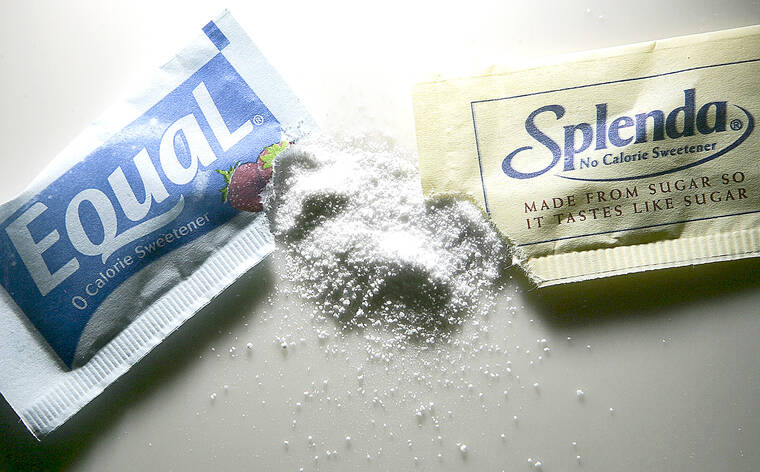Artificial sweetener aspartame is ‘possibly’ carcinogenic, yet safe at common use levels, who says
Concern about aspartame’s health risks was reawakened after one unit of the World Health Organization classified the artificial sweetener as a possible carcinogen and another agency cleared the substance for consumption at common levels.
Aspartame was labeled Friday as a possible cause of cancer in a report from the WHO’s International Agency for Research on Cancer, based on limited evidence. A joint committee between the WHO and the Food and Agriculture Organization of the United Nations said the same day that the safety of aspartame isn’t a major concern at current levels of recommended consumption.
ADVERTISING
The controversy escalated when the U.S. Food and Drug Administration took the rare step of showing public disagreement with the WHO. The conflicting statements by health authorities and the food industry are bound to confuse consumers over a sweetener that’s ubiquitous in diet drinks, yogurt, ice cream, breakfast cereals and even toothpastes and medicines.
Francesco Branca, director of the WHO’s Department of Nutrition and Food Safety, said that research has pointed to a possibility that needs to be investigated further. In the meantime, he urged consumers to look for products without sugar or sweeteners and drink water instead of sugar-sweetened and diet drinks, speaking at a press conference in Geneva.
Sweeter Than Sugar
A chemical-based sweetener that is hundreds of times sweeter than sugar, aspartame is packaged and sold under names such as Equal. The U.S. FDA approved aspartame in certain products in 1974, issuing a safety finding in 1981 and approving it as a general-purpose sweetener in 1996.
The classification system of the WHO’s IARC body consists of four levels: carcinogenic, probably carcinogenic, possibly carcinogenic and no classification. That means aspartame falls into the agency’s second-lowest level of risk for cancer. The designation means that there’s some evidence that the substance can cause cancer to humans, though it’s not conclusive.
The FDA rejected the IARC’s finding.
“Aspartame being labeled by IARC as ‘possibly carcinogenic to humans’ does not mean that aspartame is actually linked to cancer,” the FDA said in a statement. The food and beverage industry had been expecting the new designation from the WHO. Industry trade groups and experts from the science community criticized the limited evidence of the IARC study, and reiterated earlier studies that have deemed aspartame innocuous.
“There is a broad consensus in the scientific and regulatory community that aspartame is safe,” Kevin Keane, interim president and chief executive officer of the American Beverage Association, said in a statement. “It’s a conclusion reached time and time again by food safety agencies around the world.”
Many scientists urged consumers to focus on the advice of the JEFCA study, which didn’t change what it considers an acceptable daily amount of aspartame. The agency has previously determined that an adult weighing 70 kilograms, or 154 pounds, can consume 9 to 14 cans of soda daily, each containing 200 to 300 milligrams of aspartame, and stay within a safe range of consumption.
The IARC’s classifications are often misunderstood because they are based on potential hazard and not actual risk, wrote Kevin McConway, an emeritus professor of applied statistics at Open University. The IARC is supposed to evaluate if there is any possibility of a link, and it’s the JEFCA’s job to judge the actual level of risk, he said.
“It remains perfectly possible that it cannot cause human cancers at all,” McConway said.
‘Evidence Is Weak’
“If there was any cause for concern, they would have adjusted the current acceptable daily intake,” said Arnold Baskies, the past chairman of the national board of directors of the American Cancer Society. “The general public should not be worried,” said Paul Pharoah, a professor of cancer epidemiology at Cedars-Sinai Medical Center in Los Angeles. “The evidence that aspartame causes primary liver cancer, or any other cancer in humans, is weak.”
PepsiCo Inc. Chief Financial Officer Hugh Johnston, who has been with the food and beverage company since 1987, said that hundreds of studies over the years have found aspartame to be safe. “Aspartame is one of the few things that’s probably been around PepsiCo longer than I have,” he said.
The two WHO reports on aspartame and cancer come two months after the WHO said that artificial sweeteners might not help people lose weight. The U.N. body said evidence showed that products containing aspartame and stevia — which are often marketed as diet foods — probably don’t help reduce body fat in the long term.


